
Original Link: https://www.anandtech.com/show/2426
Who Am I?
I awoke today to a gray dawn, the rain pouring down outside my window. I looked around, uncertain of where I was... and come to think of it, who, what, and when I was. I stood up from my sleeping mat, glanced around the unfamiliar surroundings, and managed to find something that would pass as clothing. Opening the door to my room, I found a small package outside with a note. "You have amnesia. Try this — it will help." What the...?
 Deja vu |
Along with the note was a rectangular box with a strange looking fox head on the cover and the words "The Witcher" across the top. Opening the box, I found a shiny circular disc. Memories poked at my fogged mind: "It's a DVD — you put it inside a computer." My unknown benefactor appeared to be right; the box was helping my memories to return. Walking down the hall, I found a convenient table with food and a laptop sitting on it; might as well get started….
As I watched the opening sequence of this "game", I began to recall more of my past: books I read, people I knew, getting sick at tradeshows, working on computers, and doing something called "benchmarking" until my eyes bled. Another phrase kept popping into my mind: "A non-tech". Who or what that meant, I just couldn't guess. Back to the game, I was walking around a virtual world, talking to people, killing people, and occasionally sleeping with people. Every now and then, I would level up, regaining lost memories and skills.
While my virtual counterpart became more adept at slicing and dicing monsters, my real-world skill upgrades were less dramatic. Typing could be upgraded with 60 WPM and Enhanced Carpal Tunnels, with the level 5 upgrade being Speech-Recognition. Strength upgrades featured skills such as Mountain Biking, Hiking, and the ability to Lug around 20 Pound Desktop Replacement Notebooks. Stamina skills were similarly useful: All-Night Gaming Sessions, Extra Caffeine Tolerance, and Resistance to Tradeshow Meetings. Perhaps I should've started with the Intelligence category, however: Improved Wit, Analogies, Insightful Commentary, and Internet Author were available. Unfortunately, I ran out of skill points after choosing the Author upgrade — it was Improved Wit or the Nacho Champion stamina upgrade! At least you're getting a review, even if it is for a two month old game….
If you're thinking right about now that that's the most clichéd introduction to an article you've ever read, you're probably right. Nevertheless, the same cliché serves as the basis for The Witcher, a game developed by CD Projekt and published by Atari. Don't let that deter you, however, as what follows that generic introduction is anything but. The Witcher is set in a fantasy world based on the books of Polish author Andrzej Sapkowski.
 Believe it or not, there's a laptop on a desk inside |
Who? Okay, so most of us very likely don't speak Polish and have never read any of his books, but they appear to be extremely popular in Poland and they are being translated into other languages. I'm a huge fan of fantasy and sci-fi books, and I often wish that the stories in computer games could reach the same level as what we find in the pen and ink world. Some of my favorite games of all time have been based on literature — Neuromancer and Betrayal at Krondor — so I was more than happy to give The Witcher a shot.
Welcome to My World
The Witcher is powered by BioWare's Aurora 2007 engine, a heavily modified version of the engine behind Neverwinter Nights — and it really is heavily modified, to the point where if the BioWare logo wasn't present on the box, you likely wouldn't make the connection. Initially launched in late October 2007, The Witcher is set in a dark, violent world perched on the brink of destruction. Your job, naturally, is to take the role of the Geralt, the White Wolf (from The Witcher books — now apparently resurrected without much of his memory) and set things right.
 It's good to be the king |
How you happen to define "right" will affect certain aspects of the game; as the box says, "There is no good, no evil — only decisions and consequences." If you read the marketing material, you'll find information about how you have to make tough decisions that have world changing consequences. Depending on the choices you make, the game will branch down different paths with three supposedly unique endings. I'm also a big fan of the Fallout games, so perhaps I got my hopes up a little too much. Suffice it to say, while there are a few major decisions to make throughout the game, the actual impact on the game world appears to be extremely small, mostly determining whom you have to fight and which characters "like" you. The three "unique" endings are achieved by deciding to side with the bad guys, the other bad guys, or by refusing to choose a side and remaining neutral — and you get to fight both parties of "bad" guys.
 The ice age cometh |
Okay, so perhaps it's not quite that simplistic, but if you're looking for an ending where everything turns out okay, prepare to be disappointed. This is not to say that the ending is bad, but this isn't a story put together by your typical Hollywood think-tank, and Walt Disney definitely wouldn't approve. This is a mature game with mature themes, and like the real world rarely do things and "happily ever after". That said, the ending was satisfying, even if it does leave the door open for future titles.
 American dryads have long hair and wear thongs; European dryads are less inhibited |
One final item worth mentioning before we get into the heart of the review is that this really is a mature game, in every sense of the word. The Witcher definitely earns its 17+ ESRB rating, with the following content: Blood and Gore, Partial Nudity, Strong Language, Strong Sexual Content, and Violence. Yes, that's correct: your in-game avatar can actually participate in sex during the game, with a variety of women. Before any of you get too excited, the reality is that the sexual content doesn't even match what you're likely to see on primetime television or soap operas, basically giving you a fade to black with a picture of a woman in a revealing pose. Of course, if you're capable of reading this article, you're more than capable of finding much worse material in a matter of seconds. [Note: The non-US version is apparently less prudish, featuring actual nudity at parts. The European version would qualify as an R-rated movie, in computer game form.]
If you enjoy listening to the Jack Thompsons of the world, games like this are contributing to the downfall of society and turn people into raging sociopaths. Apparently, The Witcher doesn't have a large enough following as yet to warrant his attention, and I have managed to stave off the urge to kill anyone or go looking for a prostitute. Still, if any of the last two paragraphs offend you, definitely give The Witcher a wide berth. [Ed: There goes another three readers….] Okay, with that out of the way, let's get into the nitty-gritty details of The Witcher.
Check Out My Swords
Somewhat surprisingly, The Witcher is a game developed specifically for PCs, though it plays in many ways more like a console RPG. You play from a third person perspective, with the option to choose between three camera angles. F1 and F2 are more of a top-down view, and you click on the ground as you would in Neverwinter Nights to move your character around. The preferred perspective and method of control — according to the game as well as my personal preference — is an over-the-shoulder (OTS) camera and the use of WASD to move your character around in FPS fashion (select using F3). Left-clicking interacts with objects and people and attacks enemies while right-clicking uses Signs — The Witcher equivalent of spells. As part of the Games for Windows initiative, The Witcher supports the Xbox 360 controller in addition to standard keyboard/mouse input. It also works with Windows Vista — 32-bit and 64-bit versions.
 Looks a lot like Washington in the winter |
The majority of the game is spent running around talking to people, slaying monsters, reading books, playing FedEx delivery man, etc. — all staples of RPGs. While the game doesn't necessarily break any new ground in these areas, the quality of writing and the plot is certainly up there with the best of the genre. There are substantial differences in the game worlds and implementation, but personally this ranks right alongside games like Baldur's Gate 2 for having an involved and interesting story. Let's talk about some of the differences, though.
Combat is a real-time affair, although it can be paused at any time by pressing the spacebar to browse your inventory or give other commands. That still might sound like Baldur's Gate, but in truth it's not. Combat is a much more visceral experience, straddling the line between full-blown action-oriented gameplay and turn-based combat, but falling much closer to the former than the latter. Clicking on an enemy will draw your weapon — generally speaking, this is one of two Witcher swords, steel for humans and silver for monsters — and clicking on an enemy when your sword is drawn will initiate a sequence of attacks. After a set series of slashes, thrusts, and/or stabs, you must click on the monster again at the appropriate time to chain a second attack. Time this properly, and Geralt will begin another sequence of blows, more damaging than the previous attacks. Depending on the weapon, combat style, and skill level of your character, you can chain together up to five attack sequences — at which point all but the most powerful enemies will be dead.
 This is me, buffed out at the end of the game |
Skills are upgraded by spending bronze, silver, and gold talent points, in most cases acquired when you gain a level - there are a few other instances where you will gain a talent point, but these are the exception rather than the rule. Levels one and two can be upgraded with bronze talents, three and four require silver talents, and level five requires gold talents. The first ten character levels will give you three bronze talent points; the next ten will give you one silver and two bronze points; the final ten (maximum level appears to be 30, but it might be higher) you get one bronze, two silver, and one gold. There are three categories of skills you can upgrade: attributes (affect everything), swords, and signs - see below for discussion of the latter two. Certain attribute levels are required to reach higher levels with the combat skills (again, see below), and there are also a few special skills are only available after you consume a mutagen potion.
Weapon skills are broken down into two primary categories: steel sword and silver sword. Each category has three subcategories: strong attack (strength), fast attack (dexterity), and group attack (stamina) — you can have a sword skill one level higher than the associated attribute (shown in parenthesis). You upgrade all six areas independently, so you can potentially be very deadly against groups of monsters while using your silver sword and yet completely inept when it comes to using the strong style with a steel sword. The strong skill is best used against slower, more powerful opponents — faster opponents will parry your blows, interrupting your attack sequence. Similarly, the fast skill is for use against more agile opponents, and while it's not as likely to be parried by a heavily armored foe it does happen and even when successful it doesn't do as much damage. The group skills help to fend off multiple opponents, and become particularly effective when you're fighting three or more creatures at the same time. You can switch between any of the three attack modes by pressing a button, but you cannot chain together different fighting styles. Switching weapons requires more time and leaves you vulnerable to attack.
Signs are the other part of combat - think of signs as a quick mini-spell that doesn't leave you sitting around chanting, waiting for someone to stick a sword through your heart. There are five signs, the most useful (in my view) being the Aard (stun/knockout/push away) and Igni (explosion/fireball/ignite) signs. Others allow you to temporarily shield yourself — great for when you need to drink a potion or want to run away — cause fear/hex in nearby enemies, or set a trap on the ground (Quen, Axii, and Yrden respectively). Use of signs is related to your intelligence attribute, and you can have a sign level one higher than your intelligence — so level four intelligence allows you access to all sign levels. Again, on the hard setting signs are probably more helpful, or maybe if I had powered up the Axii/Yrden options they might have helped in a few battles. Most of the time, I found Aard to be sufficient, allowing me to stun enemies and then kill them off with a finishing blow, with an occasional Igni tossed in for good measure.
 Fighting a group of drowners |
Besides swords, you can also find daggers, torches, clubs, axes, hammers, and maces. While some of these might look cool, the fact of the matter is that none of them are particularly useful in combat compared to your swords. The reason is that your Witcher skills only apply to swords, so you don't get to chain together more than two attacks and you don't do as much damage if you're not using swords. The net result is that any other weapons you encounter are pretty much only used for being sold and earning money. The potential exception is the torch, which can provide light in dark areas. However, since the torch makes an ineffective weapon, you are better off using your potions to gain your night vision ability.
Stirring Up My Witcher's Brew
Potions and night vision? This is another pretty major part of the game: alchemy. Throughout the game, you will learn about new potions you can make by talking to people or reading books and scrolls. You'll also learn about various plants you can harvest for use in potions, and many of the monsters you slay will provide you with ingredients. With the appropriate recipe, take a strong alcohol and add in the necessary ingredients while resting and you create a potion. The quality of alcohol determines how many ingredients you can use — depending on the potion, you may need three (strong), four (high-quality), or five (top-quality) ingredients — the more ingredients, the higher the alcohol quality (i.e. the more expensive the alcohol). Luckily, you may use any strong alcohol with three ingredients to create a White Gull potion that can function as a top-quality (five ingredients allowed) alcohol. (Weak and moderate alcohol serves no use other than a way to get Geralt drunk.)
 Not as good as a crock pot, but it will do. |
Effects of potions vary, providing you with the ability to see in the dark (Cat), improved offense at the expense of your defense of abilities (Thunderbolt), accelerated speed and attack abilities (Blizzard), increased endurance regeneration (Tawny Owl), accelerated healing (Swallow), and dozens of others. The effects can also last for anywhere from 30 minutes of game time to as long as half a day. The catch with potions is that they all increase your body's toxicity — your mother warned you about drinking too much alcohol, right? The result is that you usually can't have more than about three to five (depending on level and attributes) active potion effects running at the same time. There's also one potion (White Honey) that will reduce your toxicity to zero, but it will also remove any other potion effects. Determining which potion to drink for certain battles can be critical to your success.
The game suggests that the necessity of using alchemy varies by difficulty level, and as I only beat the game on medium difficulty I can't fully confirm this. What I can say is that on medium difficulty, certain battles — especially boss battles — are nearly impossible to beat without using several potions. There were plenty of potion types that I almost never used, like the one that allows you to see invisible creatures and the one that turns your blood to poison, harming any bloodsucking creatures that attack you. Since I never encountered an invisible creature in medium difficulty mode and had few problems with bloodsuckers, these two potions were essentially useless. With a few tweaks to the difficulty level of the monsters, however, I could see alchemy becoming far more useful.
 'Ware the Striga! |
Besides potions, there are two other types of objects you can create using alchemy. The first of these is blade coatings. These appear similar to a potion in your inventory, but instead of drinking then you apply them to one of your swords. They can increase the effectiveness of your weapon against certain types of monsters, improve the chance of causing bleeding or pain, poison your enemies, and a few other effects. Basically, blade coatings make your weapons do more damage. They last 24 hours, but you can't stack effects. There are also a few miscellaneous objects you can find throughout the game that will enhance your weapons for 24 hours — grind stones, diamond dust, and rune stones to name a few. Blade coatings use grease as the base of the potion rather than alcohol, again with different grease qualities allowing you to use three, four, or five ingredients.
 The slowest level of the game — fire's bad, m'kay? |
The final use for alchemy is creating bombs — which requires a level 3 intelligence perk. Once more, there are three categories of powder that will allow you to add three to five ingredients. Bombs create an area effect "spell" around Geralt that will temporarily stun, damage, poison, ignite, or scare your nearby foes — certain creatures of course being less susceptible to the bomb effects. While I used plenty of potions and the occasional blade coating, bombs were generally not required. When completely surrounded, a bomb that would stun/blind/ignite five or six enemies was somewhat useful, but almost never required. At the highest difficulty setting, this very likely would not be the case and bombs would be more important.
A Farewell to Packrats
Given how much of your inventory ends up being devoted to storing potions, ingredients, and alcohol, this is as good a place as any to discuss what else can go into your inventory. The short list includes scrolls and books (you can sell or drop these after reading); various pieces of food and weaker alcohols (you can eat/drink/get drunk, sell, or sometimes give to hungry NPCs); jewelry, clothing, flowers, and gems (sell for money, or sometimes use as part of a quest); and a few other miscellaneous odds and ends. Outside of items that may or may not be used in a quest at some point — anything used in a quest can easily be acquired later — your inventory basically ends up being used to store items that you might sell for money.
 Not a lot of room, until you realize most stuff is junk you don't need |
You can't carry more than a few weapons at one time, and those that you can carry only fit in certain slots. During the course of a game, you will only wear three different pieces of armor and use perhaps half a dozen swords. For the most part, your inventory ends up being devoted to alchemy. This isn't necessarily a bad thing, provided you can overcome any latent packrat mentality. Simply pick up the few objects that you want and leave everything else behind. This is almost the polar opposite of Hellgate: London, where a vast majority of the game revolves around your equipment.
 As usual, lots of people need your help. |
Since we've now covered most of the user interface, we might as well take a moment to go through the rest of the options. Outside of inventory and character management screens, the only other noteworthy parts of the interface involve the Journal. As you would expect, the Journal keeps track of Quests. You can view just the active quests and quest stages, or if you want to look at old quests/stages you can uncheck the appropriate boxes. You can also view quests by chapter and whether they are a main quest or a side quest — very convenient. Any entries in the journal that have been updated since the last time you viewed the appropriate page will have a red exclamation point next to them.
 I didn't ever use many of the formulas |
The Formula page provides information about various alchemical formulas that you've learned. This information is actually largely redundant, as you can get the same information in the alchemy screen when you're brewing potions, and you don't actually need to manually concoct each potion. Simply click on any of the active potions (only potions where all of the ingredients are available are active), and the appropriate items from your inventory will be selected. Even less useful is the Ingredients page, which consists of one sentence descriptions of the dozens of the Ingredients you can find in the game.
 Oh, the people you'll meet… |
 The places you'll go… |
 And the indigenous life forms you'll slay. |
 Random background information |
The Characters, Locations, Glossary, and Monsters pages are all very similar and contain background information on the appropriate subject. Glossary is sort of a catchall area with details about some of the factions you encounter in the game, the history of the game world, magic, medicine, political forces, etc. There's also a tutorial page where you can reread the hints that pop up at the very beginning of the game.
At first blush, all of this may seem extremely complex and convoluted. In actual practice, the journal is mostly composed of extra information that you may or may not want to read — just like the many books that you find throughout the game. I enjoyed the extra detail and read everything, but then I did the same thing in Oblivion — and before that in the Ultima games and many other RPGs. If you enjoy that type of game, The Witcher will accommodate you; if you just want to stick to the meat of the story, you can do that as well. Outside of updating quest information (which updates the appropriate journal entry), none of the actual text that accompanies any book/scroll is required reading material. There also aren't nearly as many extraneous books as in Oblivion, where only a small fraction contained something more than background information.
A Fly in the Ointment
While The Witcher takes place in a deep, interesting game world and provides a lengthy gaming experience — the box states 80 hours or more, which pretty much matches my experience — not all is perfect. In fact, at launch things weren't even remotely close to perfect. My first encounter with the game came in early December, and while I was very interested in continuing play I encountered so many stability problems and the level load times were so long that I probably wouldn't have finished. Late December brought about the 1.2 patch, which dramatically improved the situation. Load times were cut down by a factor of around five, and the same goes for save times. On the one hand that sounds impressive, but the fact that they were even able to make such an improvement points towards a rushed release. Wait — a game being rushed out just prior to the holiday shopping season? Say it isn't so! Needless to say, considering the number of transitions you have to make between areas — wandering in and out of houses and other buildings is a common occurrence — waiting for 60 seconds or more for an area to load quickly becomes tiresome. 5-12 seconds is much more palatable, though it's a shame that even with 4GB of RAM you have to deal with relatively long transition times.
The other major issue I had with the game involves stability, or the lack of it. The Witcher would frequently crash after playing for anywhere between 30 and 120 minutes. I tried it on four different systems, with various graphics cards and driver versions, with and without the 1.2 patch. Three of the four systems invariably would crash to desktop after a while, so frequent saving was absolutely required. What about the fourth system? That's where things become interesting.
Two of the systems were running Windows Vista 32-bit, one with a Radeon X1950 XTX and one with a GeForce 8800 GTX. Both had 2GB of RAM. Neither system worked well past ~60 minutes of playing — sometimes more, sometimes less. Given that the support page explicitly mentions installing the virtual graphics memory hotfix for Vista, I thought that perhaps that was the problem, but the crashes continued. Even with the hotfix, Vista still requires more memory than XP, so my next test was on a Windows XP system, this time with a Radeon X1900 XT but still running 2GB of RAM. Once again, stability became a problem after an hour or so.
The fourth and final system was the Widow PC Sting 517D2, which just happened to be running Windows Vista 64-bit and 4GB of memory. I won't say that the game never crashed on this system — it did crash, a total of three times (compared to dozens on the other systems) — but it was much more stable than any of the other systems I tested on. Unfortunately, I only had that one system with 4GB of memory and Windows Vista 64-bit, so I can't say whether it was the extra memory or the 64-bit OS (or both) that more or less solved the stability problems. Here's hoping we see a 1.3 patch in the near future that addresses the remaining stability problems.
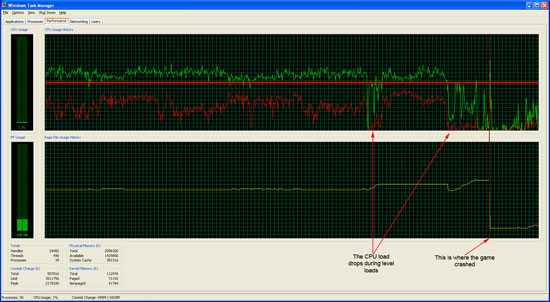 Task manager - my favorite Windows app! |
Update: Thanks to the readers for suggesting the 3GB application memory space fix. It seems I incorrectly assumed that more than 2GB of physical RAM was required for that to make a difference. After running "BCDEDIT /set IncreaseUserVa 3072" on Windows Vista 32-bit, my stability problems have disappeared (at least in one extended play session). This of course raises the question of why this fix isn't specifically listed on the patch page, as well as why the game can't simply detect that it's allocating more memory than is normally allowed. The onus should be on the creators/publishers to provide support and fixes, and burying the information in the support forums is a less than ideal approach.
Performance is something of a concern as well. While The Witcher will run reasonably well on most recent gaming systems, you need a rather powerful system if you want to turn up all of the detail settings. You can see in the above image (Opteron 165 @ 2.4GHz with X1900 XT) that the game does make use of dual-core processors to a certain extent — or at least it uses most of one core and the graphics subsystem/drivers do some work on the second core — and large portions of the game are playable at higher resolutions even on slightly older graphics cards. However, there are other areas where even a GeForce 8800 GTX delivers poor performance, likely a side effect of the Aurora engine.
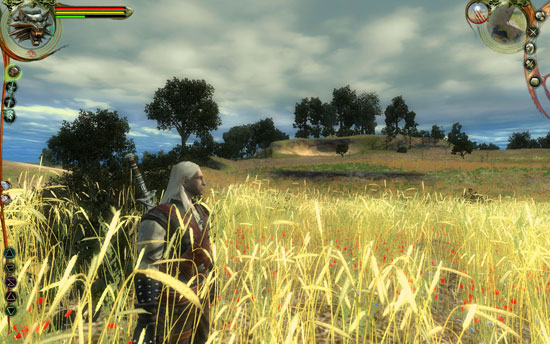 High detail setting |
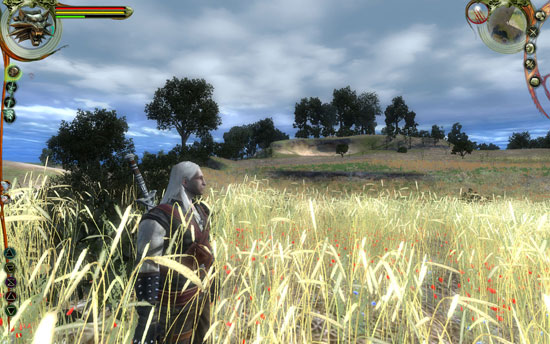 High detail with lighting and shadows turned down one notch |
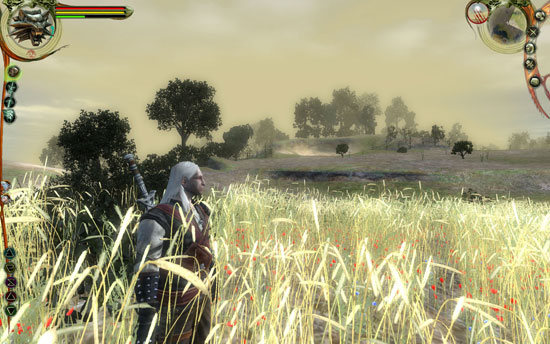 Medium detail |
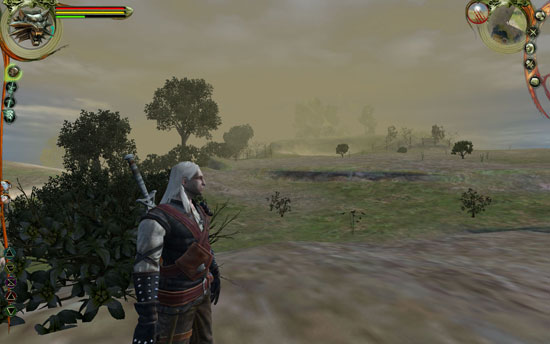 Low detail |
Turning down the detail settings and/or resolution will typically solve any performance problems, but as you can see in the above images there's a pretty serious drop in image quality when you go from high to medium-high settings. Turning lighting quality to the maximum provides a noticeable improvement to the visuals, but the performance impact is similarly large. While the game only officially requires a Shader Model 2.0 graphics card to run, we would recommend a GeForce 7900 or Radeon X1900 at the very least. If you're looking to upgrade, the latest GeForce 8800 GT and Radeon HD 3850 are both reasonably affordable and are more than capable of running The Witcher at high detail settings and moderate resolutions (1440x900 or lower, perhaps 1680x1050 if you're not too demanding).
Technical problems aren't the only shortcoming of The Witcher. While I did find the gameplay enjoyable for the most part, combat does begin to wear a little thin. Click. Slash-swish-slash. Click. Swish-chop-slash. Click. Chop-hack-whack…. Sure, sometimes you have to change fighting styles, or double-tap a movement key to try to get out of the middle of a group of monsters putting the beat-down on you, but while the battles do look impressive they also become very repetitive. The boss monster battles at least keep things exciting, but there are only a handful of these throughout the game. On the bright side, you can run away from most fights, and your clicking finger won't get quite as tired as it does in games like Diablo.
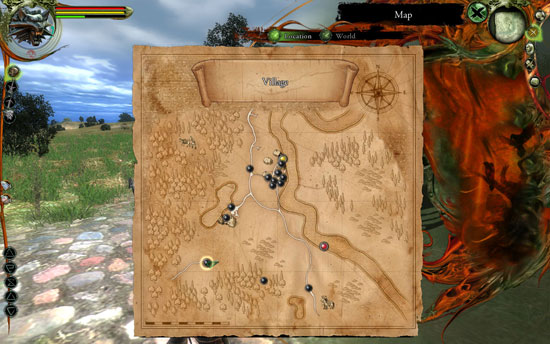 Why can't I just click on a dot to go there!? |
The other major gameplay complaint involves the constant running about. The game is divided into five chapters, plus prologue and epilogue. Once you leave a chapter, there's no returning, so make sure you complete all of the quests specific to that chapter before moving on. However, it's a good thing you can't backtrack through old areas, because it takes long enough to run back and forth across the three or four major maps that comprise each chapter. Chapter 3 does provide you with a teleport system, but even that doesn't prove to be particularly useful since you still have to run to and from the teleport rooms. What would have helped tremendously is some sort of quick travel system that would take you to any of the major locations that you've previously visited. Sure, that probably would have cut game time down to around 30 hours, and it would've eliminated half of the random monster encounters, but neither change would have been for the worse in my opinion.
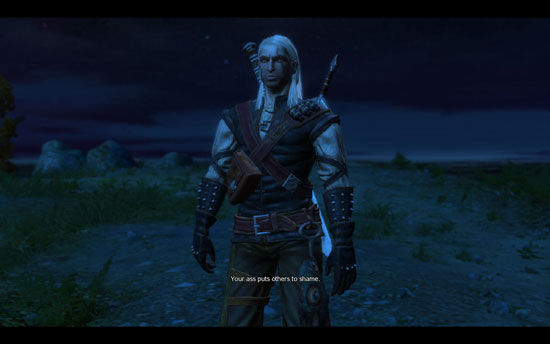 Two seconds later, she jumped in bed with Geralt. (Honest!) |
Then there are the mini-games: drinking, gambling, and womanizing. Okay, the last one doesn't really count as a "mini-game", but the presentation does make one wonder if the developers/writers behind The Witcher aren't a bunch of misogynistic — or at least sexually repressed — men. Maybe they're merely being true to the source material, but the way random women seem to throw themselves at you leaves much to be desired. There are two major "romantic interests" in the game, but neither one would qualify as anything remotely like a real relationship. Take the following sequence: "You don't spend enough time with Alvin!" [Walk downstairs and tell Alvin he'll get a dog someday.] "I'm glad you're spending so much time with Alvin!" Romeo and Juliet this is not.
The drinking "game" is even worse: a few times in the game you will have to get drunk with one of the NPCs. There's no skill or anything else involved: you just keep sharing drinks until you win, and once you learn the formula for the Wives' Tears potion (it removes all intoxication), drunkenness has no meaning. Out of the three, gambling is the best, but even here it's like playing a form of Yahtzee/poker against a half-wit; the computer opponents rarely make the best move, often throwing away a winning "hand" for no apparent reason. It makes winning money easier, but it's not really challenging or fun.
Before you start to wonder how I could say anything positive about this game after this page full of criticisms, remember that the overall impression is generally a lot more important than complaints about select areas. The mini-games are frankly a non-issue, totaling less than 5% of the gaming experience. The womanizing can be skipped, should you choose. The stability problems and lack of quick travel are both flaws, but while they might detract from the experience they don't turn a good game into a lousy game. This is a game that was potentially great, but it ends up being merely good. If you're a fan of the genre and of good storytelling, don't let any of the criticisms on this page keep you away from playing The Witcher. At the very least, download the demo and give it a try.
Witcher = Neutrality = Good?
Like many of the games that get released today, The Witcher is something of a diamond in the rough. Whether you're willing to put up with the flaws or wait for someone else to come along and polish it is up to the individual. Perhaps like the protagonist, the game is neither strictly good nor bad, but instead takes the neutral path. Depending on your own inclinations, neutrality may be just what the doctor ordered. Certainly, this isn't a game for everyone, and I imagine there are some people out there that absolutely despise it. Those people probably also hate games like Oblivion, Fallout, Baldur's Gate, Planescape: Torment, Ultima Underworld, and a number of other games that I absolutely loved.
 Druids would be proud. |
If you liked any of the titles I just listed, chances are you will enjoy The Witcher, warts and all. The combat system is a refreshing change of pace, keeping things from getting bogged down in the turn-based world of Dungeons & Dragons without becoming completely twitch-based. The story is definitely compelling, and while the choices you make might not ultimately have a huge impact on the ending, I at least was left wanting more. The graphics and sound are good if not great, helping to draw the player into the rich world of Andrzej Sapkowski. In fact, after playing the game, I'm one of likely many people that will now go out and pick up his books, just to experience more of the world of Temeria and its denizens.
 Look - depth of field effect (which is only in cut scenes). |
The Witcher ranks as the best PC role-playing game I've played since Oblivion. Then again, outside of Neverwinter Nights 2, there haven't been all that many RPGs in the past two years for PCs. If you're willing to stretch the definition of RPG a bit, games like STALKER and Bioshock enter the picture, both of which I would rate above The Witcher. However, the game is a lot closer to Oblivion than it is to STALKER, so that's probably not a fair comparison. If you're like me — an RPG fan that detests MMORPGs and is eagerly waiting on Bethesda to finish up Fallout 3 — there simply aren't that many other options out there right now. Lucky for us, we have The Witcher to help tide us over. We may be left wondering how or why Geralt came back from the dead, but you certainly won't find me complaining about his reappearance.
| The Witcher Official Requirements | ||
| Required | Recommended | |
| CPU | Pentium 4 2.8GHz+ or Athon* 64 2800+ | Pentium 4 3.0GHz or Athlon* 64 3000+ |
| RAM | 1GB | 2GB |
| Storage | 8.5GB free HDD space, DVD-ROM** | 8.5GB free HDD space, DVD-ROM** |
| GPU | GeForce 6600 or Radeon 9800 | GeForce 7800 GTX or Radeon X1950 XT |
| DirectX | DirectX 9.0c | DirectX 9.0c |
| OS | Windows XP/Vista | Windows XP/Vista |
*: Athlon
XP series is not (officially) supported.
**: Direct2Drive version available.







